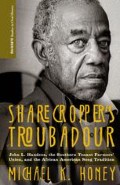Abstract
In 1982, John Handcox attended a 48-year reunion of about 150 surviving members of the Southern Tenant Farmers Union (STFU) held at the historic First Baptist Church on Beale Street in Memphis. A reporter pictured Handcox at 78 years of age as “a lean, white-bearded black man.” Asked to describe the conditions of 1934, John recalled that on the big plantations, “The highest-paid hand was 75 cents. He worked from can to can’t. That’s from the time you can see till the time you can’t. They used to ring the bell at 5 a.m., and you had to get down to the barn and harness the mule by lantern light.” Asked about his song, “Raggedy, Raggedy Are We,” John recalled, “It was written for rough, tough, raggedy times” when one could tell country folk from city dwellers because they “was all patched up, had them raggedy clothes on ‘em.” He also volunteered:
If I wrote a song today it would be about hard times. I could write one about modern conditions if I wanted to. They don’t exactly compare to the ‘30s, but they’re still hard. A lot of folks are out of work. If it wasn’t for social security, it would be pitiful. The social security it not enough to live on, but it’s enough to exist. I’m one of the fortunate poor because I’ve always had enough to eat. My stomach was never in danger of collapsing. It will do that, you know, if you don’t get something between your f ont and your back. 1
Raggedy, raggedy are we
Just as raggedy as raggedy can be.
We don’t get nothin’ for our labor
So raggedy, raggedy are we.
Access this chapter
Tax calculation will be finalised at checkout
Purchases are for personal use only
Preview
Unable to display preview. Download preview PDF.
Notes
“Farmer’s Memory Sings ‘Raggedy’ Tune,” originally published in The Commercial Appeal (April 17, 1982), eds. Philip S. Foner and Ronald L. Lewis (1983), 192.
Johnny Cash, The Autobiography. San Francisco: Harper, 1997.
“Raggedy Raggedy Are We” in Alan Lomax, Woody Guthrie, and Pete Seeger, Hard Hitting Songs for Hard-Hit People. New York: Oak Publications, 1967, 265.
US Census Bureau, Population Census of the United States: Brinkley Township, Arkansas (1920).
Jeannie Whayne, Delta Empire: Lee Wilson and the Transformation of Agriculture in the New South. Baton Rouge: Louisiana State University Press, 2011, 125.
Nan Elizabeth Woodruff, American Congo: The African American Freedom Struggle in the Delta. Cambridge, MA: Harvard University Press, 2003, 11.
Whayne, “’I Have Been through Fire’: Black Agricultural Extension Agents and the Politics of Negotiation,” in African American Life in the Rural South, 1900–1950, ed. Douglas Hurt. Columbia: University of Missouri Press, 2003.
Clyde Woods, Development Arrested: The Blues and Plantation Power in the Mississippi Delta. London: Verson, 1998.
James Ross Jr., “‘I ain’t got no home in this world’: The Rise and Fall of the Southern Tenant Farmers’ Union in Arkansas” (PhD diss., Auburn University, 2004), 22.
Joe William Trotter, The Great Migration in Historical Perspective: New Dimensions of Race, Class, and Gender. Bloomington: Indiana University Press, 1991.
Jeannie Whayne, A New Plantation South: Land, Labor, and Federal Favor in Twentieth-Century Arkansas. Charlottesville: University Press of Virginia, 1996, 29–53.
Grif Stockley, Ruled By Race: Black/White Relations in Arkansas from Slavery to the Present. Fayetteville: University of Arkansas Press, 2009.
Richard Wright, 12 Million Black Voices: A Folk History of the Negro in the United States. New York: Viking Press, 1941, 46.
John Herbert Hayes, “Hard, Hard Religion: Faith and Class in the New South,” (Ph.D. dissertation, University of Georgia, 2007), 313–4.
Kieran Taylor, “’We Have Just Begun’: Black Organizing and White Response in the Arkansas Delta, 1919,” The Arkansas Historical Quarterly 58:3 (1999), 264–284.
See also Robert Whitaker, On the Laps of Gods: The Red Summer of 1919 and the Struggle for Justice That Remade a Nation. New York: Three Rivers Press, 2009.
Grif Stockley, Blood in Their Eyes: The Elaine Race Massacres of 1919. Fayetteville: University of Arkansas Press, 2001.
James Green, The World of the Worker: Labor in Twentieth-Century America. New York: Hill and Wang, 1980, 149.
coverage in the NAACP magazine The Crisis (December 1919.
Erskine Caldwell and Margaret Bourke-White, You Have Seen Their Faces. Athens: University of Georgia Press, 1995, 6.
Pete Daniel, The Shadow of Slavery: Peonage in the South, 1901–1969. Champaign: University of Illinois Press, 1972.
Douglas A. Blackmon, Slavery by Another Name: The Re-Enslavement of Black Americans from the Civil War to World War II. New York: Anchor Books, 2009.
Howard Kester, Revolt Among the Sharecroppers, with an introduction by Alex Lichtenstein. Knoxville: University of Tennessee Press, 1997.
Norman Thomas and William R. Amberson, The Plight of the Share-Cropper. New York: League for Industrial Democracy, 1934.
George Brown Tindall, The Emergence of the New South, 1913–1945. Baton Rouge: Louisiana State University Press, 1967, 409–15.
Donald Grubbs, Cry From the Cotton: The Southern Tenant Farmers’ Union and the New Deal. Chapel Hill: University of North Carolina Press, 1971.
Pete Daniel, Deep’n as It Come: The 1927 Mississippi River Flood. Fayetteville: University of Arkansas Press, 1977.
John Barry, Rising Tide: The Great Mississippi Flood of 1927 and How it Changed America. New York: Simon & Schuster, 1997.
Philip S. Foner and Roland Lewis, eds, The Black Worker from the Founding of the CIO to the AFL-CIO Merger, 1936–1955. Philadelphia: Temple University Press, 1983, 192.
Copyright information
© 2013 Michael K. Honey
About this chapter
Cite this chapter
Honey, M.K. (2013). Raggedy, Raggedy Are We: Sharecropping and Survival. In: Sharecropper’s Troubadour. Palgrave Studies in Oral History. Palgrave Macmillan, New York. https://doi.org/10.1057/9781137088369_3
Download citation
DOI: https://doi.org/10.1057/9781137088369_3
Publisher Name: Palgrave Macmillan, New York
Print ISBN: 978-0-230-11128-8
Online ISBN: 978-1-137-08836-9
eBook Packages: Palgrave History CollectionHistory (R0)

